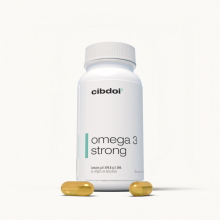Do Cardiologists Recommend Fish Oil?
Published:
Omega-3 fatty acids like EPA and DHA found in fish oil provide significant benefits for heart health. This has many wondering if taking fish oil supplements is recommended by cardiologists.
Contents:
With heart disease being the leading cause of death worldwide, cardiologists are increasingly recognizing the importance of omega-3s from fish oil for supporting cardiovascular wellness.
Below we’ll analyze the evidence on fish oil for heart health and what position cardiologists take on omega-3 supplementation.

Why Cardiologists Care About Omega-3s
Cardiologists specialize in treating conditions related to the heart and blood vessels. This includes diseases like:
- Atherosclerosis (artery plaque buildup)
- Heart arrhythmias (irregular heart beats)
- High blood pressure
- High cholesterol
- Heart attacks
- Strokes
Research shows omega-3 fatty acids from fish oil help prevent and manage many of these cardiovascular conditions. Here’s a summary of the key benefits:
- Lower triglycerides: Omega-3s significantly reduce elevated blood triglyceride levels, a major heart disease risk factor.
- Thin blood: EPA and DHA make platelets less sticky, decreasing risk of clots blocking blood flow to the heart or brain.
- Improve cholesterol: Omega-3s raise HDL (good) cholesterol and improve the LDL particle size and type.
- Reduce blood pressure: Omega-3s lower elevated blood pressure, especially in people with hypertension.
- Stabilize heart rhythm: Omega-3s help prevent arrhythmias that can precipitate heart attacks.
- Decrease plaque: Omega-3s inhibit atherosclerotic lesion development and inflammation in arteries.
Given this compelling evidence for reducing cardiovascular risk, cardiologists universally recognize the benefits of omega-3s from fish oil.
Do Cardiologists Recommend Fish Oil Supplements?
Yes, cardiologists strongly recommend fish oil supplements for supporting heart health.
In a survey published in the Journal of Clinical Lipidology, 98% of cardiologists reported recommending fish oil to their patients.
Reasons cardiologists specifically suggest fish oil include:
Potent source of EPA and DHA - Unlike flax and other plant oils, fish oil provides high amounts of the active omega-3s EPA and DHA that provide the greatest heart benefits.
High in bioavailable forms - Fish oil contains EPA and DHA in readily usable triglyceride and phospholipid forms, allowing for excellent absorption compared to some supplements.
Clinically proven benefits - Numerous randomized controlled trials demonstrate fish oil’s effectiveness for combating heart disease risk factors.
Safety profile - When purity is verified, fish oil is extremely safe even at high dosages. It does not adversely interact with most cardiac medications.
Cost effective - Good quality pharmaceutical-grade fish oil is affordable, especially considering the cost savings from reducing heart disease risk.
With its stellar safety profile, proven benefits, and cardiologist recommendation, fish oil is one of the simplest ways to support lifelong heart health.
How Do Cardiologists Suggest Taking Fish Oil?
Cardiologists provide the following guidance on using fish oil effectively:
Dosage - For general wellness, 1,000 mg EPA/DHA daily. Those with high triglycerides or heart disease may need 2,000-4,000 mg per day. Start low and increase gradually.
EPA/DHA balance - Aim for at least a 2:1 ratio of EPA to DHA for optimal heart health benefits.
Purity - Only use oils verified for purity by an independent lab like the GOED Omega-3 Verify or NSF Certified for Sport programs.
Forms - Triglyceride or phospholipid forms have the best bioavailability. Ethyl esters are synthetic and not recommended.
Timing - Take fish oil with a meal that contains fat or oil to enhance absorption. Split into two doses if reflux occurs.
Supplements vs. food - While eating oily fish is encouraged, getting enough EPA/DHA for heart health requires supplements for most people.
Other lifestyle factors - Eat a Mediterranean style diet, exercise regularly, don’t smoke, and limit alcohol intake alongside fish oil.
By following cardiologist guidance on proper fish oil selection and use, you can maximize the benefits for staying heart healthy.
What Types of Patients May Benefit Most From Fish Oil?
While fish oil provides heart benefits to everyone, cardiologists especially recommend it for patients at higher cardiovascular risk, including those with:
High triglycerides - Fish oil is highly effective for lowering elevated triglyceride levels, which damage arteries and increase plaque and clotting risk.
Arrhythmias - The omega-3s EPA/DHA help stabilize heart rhythms and prevent arrhythmias that can precipitate heart attacks.
Atherosclerosis - Fish oil supplements have been shown to regress atherosclerotic plaque development and arterial inflammation.
Heart failure - Omega-3s improve heart pumping capability and lower chronic inflammation in heart failure patients.
Post-heart attack - Starting fish oil shortly after a heart attack aids healing and lowers risk of a subsequent event.
Hypertension - The blood pressure lowering effects of omega-3s make them useful for optimizing effects of medications in people with high blood pressure.
Of course, anyone can benefit from fish oil’s heart perks. But those at elevated cardiovascular risk have the most to gain and should make omega-3 supplementation a priority.
Are There Any Concerns With Long-Term Fish Oil Use?
Provided quality and purity are verified, fish oil is very safe for long-term daily use based on extensive research.
Potential side effects are mild and may include:
- Fishy aftertaste
- Gastrointestinal upset
- Loose stools
Starting with low doses split throughout the day minimizes digestion issues. A lemon mint or enteric coated fish oil can help reduce fishy burps.
At very high intakes, fish oil may slightly prolong bleeding time. But this is not a concern at doses below 3 grams per day for most people.
Those on blood thinners should have their clotting time monitored and dosage adjusted accordingly under medical supervision. Otherwise, fish oil provides only benefits long-term.
For supporting heart health over a lifetime, the cardiologist consensus is clear – make quality fish oil supplements a daily habit.
The Bottom Line – Fish Oil Has Cardiologist Backing
In summary, extensive research confirms EPA and DHA omega-3s from fish oil support and enhance cardiovascular wellness in myriad ways.
Reducing triglycerides, stabilizing heart rhythms, decreasing plaque formation, and lowering blood pressure are just some of the proven heart benefits.
Given this compelling evidence, 98% of cardiologists report recommending fish oil, especially for those at elevated heart disease risk.
Choosing a quality fish oil supplement providing at least 1,000 mg combined EPA/DHA daily and following cardiologist guidance on proper usage is your best strategy for protecting heart health.
So next time you’re in for a check-up, consider asking your cardiologist for their advice on adding fish oil supplements to your regimen. Your heart will thank you!















